Lawrence Rockwood
 Dismissal
of Army Captain Raises U.S. Policy Questions : Military: Haiti
case illustrates conflict between following orders and belief in
a higher duty to stop rights abuses.
Dismissal
of Army Captain Raises U.S. Policy Questions : Military: Haiti
case illustrates conflict between following orders and belief in
a higher duty to stop rights abuses.
by James Risen, Originally in Los Angeles Times
May 15th, 1995
FT. DRUM, N.Y. — The facts in the case of Army Capt. Lawrence
Rockwood vs. the United States were never in dispute.
Both the defense and prosecution agreed that on Sept. 30,
1994, while serving with U.S. forces in Haiti, Rockwood left his
post without authorization, sneaked out of the Army's secured
compound and hitched a ride with a Haitian to the national
prison in downtown Port-au-Prince. Brandishing his M-16 rifle,
Rockwood single-handedly confronted the warden and demanded a
list of the prisoners in order to prevent any human rights
abuses before U.S. forces could take control of the jail.
The prison officials, part of the military dictatorship of Lt. Gen.
Raoul Cedras that was still in power, called Rockwood's bluff and
complained to the U.S. Embassy. Rockwood was arrested and sent back to
his base at Ft. Drum to face court-martial.
So it was no surprise that Rockwood was dismissed from the military
Sunday after being convicted on most counts of disobedience, disrespect
and conduct unbecoming an officer by a military panel of five senior
officers. While Rockwood will not face any prison time, he will be
stripped of his retirement and veterans benefits and will receive only
one-third of his pay until his dismissal is reviewed by Maj. Gen. David
Meade, commander of the 10th Mountain Division.
Yet Rockwood expected a court-martial from the moment he jumped the wall
of the Army compound. He left a note on his bed saying he knew he was
likely to face court-martial. He realized that the Army would be
successful in focusing its case on the narrow issues of whether Rockwood
disobeyed orders.
Yet for the U.S. Army and the Clinton Administration, the weekend
verdict will not end the growing political furor over the Rockwood case,
which has become a \o7 cause celebre \f7 for an odd alliance of human
rights groups and congressional Republicans.
Human rights groups charge that the Rockwood case shows that
Washington is still not prepared to deal with human rights abuses in the
midst of U.S. military operations, while Republicans complain the case
underscores how President Clinton is haphazardly asking the military to
handle turbulent political problems best left to diplomacy.
Amnesty International financed Rockwood's defense and brought in
former Atty. Gen. Ramsey Clark as his attorney. The organization, which
investigates human rights cases around the world, even considered
whether to list Rockwood as a "prisoner of conscience."
Meanwhile, House Republicans have held hearings on the Rockwood case,
and more are in the works.
But for Rockwood, a 15-year Army veteran who was serving as a
counterintelligence officer in Haiti, the case was really about the
conflict between the military's insistence that its officers strictly
follow orders and a soldier's higher moral duty to investigate and stop
human rights abuses. In interviews and during his testimony last week,
Rockwood said that his case dealt with the same moral and ethical
questions raised in the My Lai massacre in Vietnam and the Nuremberg and
Japanese war crimes trials after World War II.
In fact, one witness for Rockwood's defense was Hugh Thompson, a
former Army helicopter pilot in Vietnam who violated orders by firing on
U.S. troops who were killing Vietnamese civilians at My Lai. Thompson
was later awarded the Distinguished Flying Cross, and Rockwood testified
that he kept a picture of Thompson by his desk at Ft. Drum.
The Army, however, portrayed Rockwood as a loose cannon, a
"narcissistic officer" who was taking drugs for mild depression and who
endangered himself and the fragile peace achieved between U.S. forces
and the Cedras regime in the first days after the military landings.
Yet because the case raises so many awkward and potentially
embarrassing issues for the military, the Army sought at first to keep
the case quiet. The Army imposed a three-month gag order on Rockwood,
preventing him from speaking to the press until earlier this year. He
was then offered a chance to avoid a court-martial by accepting
"non-judicial" punishment, the Army's version of a slap on the wrist.
But Rockwood rejected that offer and demanded a full court-martial so he
could air his argument that the Army is ill-equipped to handle the human
rights issues that now regularly confront it in operations from Somalia
to Haiti.
"The Army doesn't know what it's doing when it comes to human rights.
They have no effective training, and the officers try to ignore these
issues," argued Rockwood. "But I think my case will do some good. I've
been told the case is already being discussed and studied at the Army
War College, as well as in law schools around the country."
Rockwood, 36, is a practicing Tibetan Buddist. He is described by
friends and colleagues as an idealist who "always acts on his
principles." He said he felt he was following the wishes of his
commander in chief, Clinton, when he went to investigate human rights
abuses at the national prison eight days after arriving.
Another excellent article is at the Socialist Action
website.
 Dismissal
of Army Captain Raises U.S. Policy Questions : Military: Haiti
case illustrates conflict between following orders and belief in
a higher duty to stop rights abuses.
Dismissal
of Army Captain Raises U.S. Policy Questions : Military: Haiti
case illustrates conflict between following orders and belief in
a higher duty to stop rights abuses.